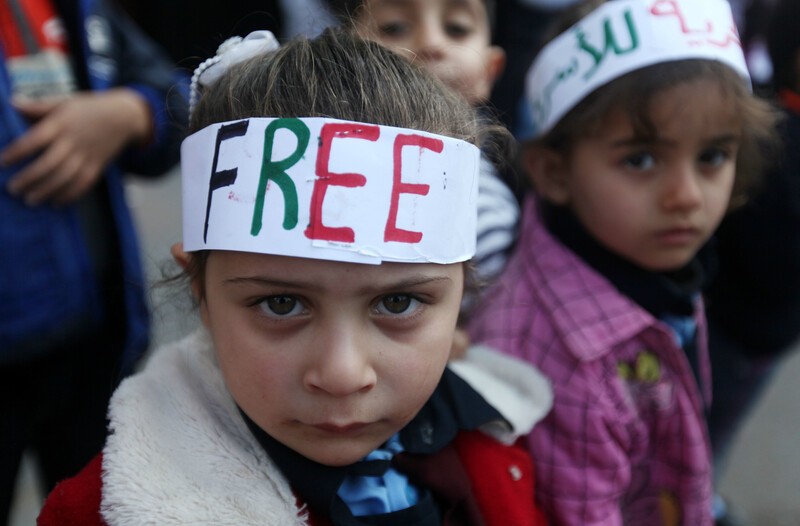The Electronic Intifada Podcast 4 January 2013
If you are experiencing problems playing this podcast from the above media player, right-click (PC) or control-click (Mac) the file link (in blue), download and play in your computer’s media player, such as iTunes.

Palestinian children at a protest calling for the release of political prisoners in Israeli jails, Gaza City, 3 January.
APA images“BDS [boycott, divestment and sanctions] is not just a mantra, it’s not just words to live by, but it’s actually a strategy that is having an impact on institutions.” - Josh Ruebner, US Campaign to End the Israeli Occupation
This week on The Electronic Intifada podcast:
- Thousands remain without water and power in Gaza one month after Israel’s attacks;
- Palestinians from the Jordan Valley who were expelled when the Israeli military declared their lands a firing zone during the Gaza attacks remain uprooted;
- A ghost town is brought back to life through architectural preservation programs in Hebron;
- News from the global boycott, divestment and sanctions movement, including an interview with Josh Ruebner of the US Campaign to End the Israeli Occupation on the many victories of 2012, and what’s in store for the movement in 2013.
Rush transcript with Josh Ruebner, National Advocacy Director of the US Campaign to End the Occupation
Electronic Intifada: So, take us back over 2012. The US Campaign to End the Israeli Occupation helped coordinate massive efforts in the BDS [boycott, divestment and sanctions] movement. How can we assess this growing international activism movement, based on what we’ve seen in 2012?
Josh Ruebner: Well I think we saw a number of really significant successes and victories in boycott and divestment organizing in the United States. Perhaps most prominently was the fact that you had two major mainstream Christian Protestant denominations passing boycott resolutions at their annual conferences in 2012, and that was the Presbyterian and the United Methodist churches.
And that was a huge advance, I think, for sort of bringing the concept of BDS into mainstream institutions in the United States. There was that, there was also a huge victory in terms of getting TIAA-CREF which is the nation’s largest financial services provider, to divest their stock of Caterpillar, as a result of nearly 10 years of organizing BDS campaigns against that corporation for its role in profiteering from Israeli occupation.
So these are really important advances that are showing that BDS is not just a mantra, it’s not just words to live by, but it’s actually a strategy that is having an impact on institutions.
EI: Josh, the US Campaign is also involved in trying to make headway into changing the entrenched policies that define the US-Israel relationship and alliances. Talk about your work at that level, and if we’re going to see any significant changes in 2013.
JR: I think it’s hard to say, and it’s definitely a tougher nut to crack. But in some respects, I’m not troubled by the fact that we haven’t yet had significant policy victories in terms of actual shifts in how the United States deals with Israel and the Palestinian people. Because the results of grassroots organizing and social change often only culminate in the policy changes that people hope to see.
I think we’re getting to the point as a movement where we need to begin thinking more seriously, thinking more strategically about how do we translate our growing impact to affect more boycott and divestment victories, to get our points of views across in the mainstream media — how do we translate this growing momentum and growing strength into actually creating some fissures and cracks within this almost uniform wall-to-wall support for Israel that we see coming out of Washington.
We’re getting there, we’re beginning to get there in terms of building a little bit more access to people in the administration, people in Congress, people in the State Department. We’re certainly doing a better job of effectively communicating our points of view to them and delivering petitions to them that are signed by 10,000, 20,000 people on specific items, but we haven’t yet been able to translate that into tangible policy victories. But I think we’ll get there.
EI: It’s a long road. And looking toward 2013, which BDS campaigns or policy campaigns should we be specifically watching?
JR: Well, the US Campaign to End the Israeli Occupation just announced a new competition that we’re doing to do a spoof ad of Sodastream, which is of course a product made in an Israeli settlement in the West Bank. Sodastream is going on a huge advertising buy, they’re doing a Superbowl ad in February which is costing them millions of dollars. So it’s really a great opportunity to do some spoofing of their product, as we’ve done of Motorola in the past.
That’s in the near term. And in the more medium term, we’ll continue doing boycott and divestment organizing within churches, on campuses, et cetera.





